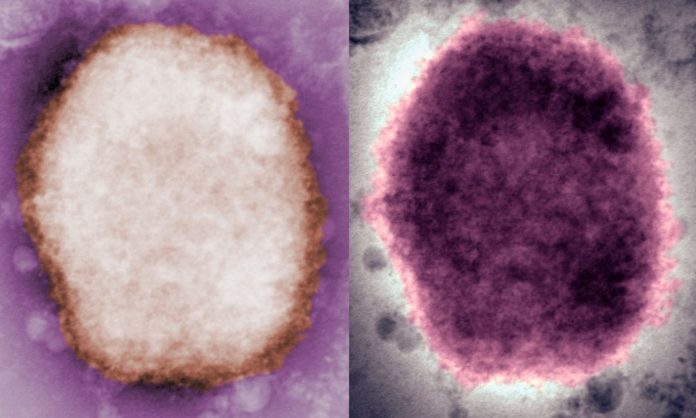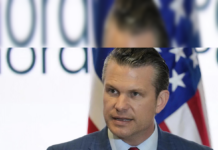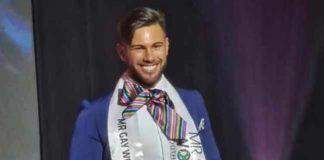Microscope image of the monkeypox virus. (Getty/ Gado/ Smith Collection)
A gay man with monkeypox has opened up about the psychological impact of isolation and the challenges he faced in getting tested after he contracted monkeypox.
Much has been made about the high incidence of monkeypox among gay and bisexual men in recent weeks. According to the UK Health Security Agency (UKHSA), at least 111 of the 190 confirmed cases of the virus between 6 and 30 May were in gay and bisexual men. Just two of those who contracted the virus were women.
David* is one of the gay men who has contracted monkeypox in recent weeks. He picked up the virus from a man he has a casual sexual arrangement with.
They later learned that David’s sexual partner contracted it from another gay man he had recently had sex with. During the incubation period, before David’s partner developed symptoms, they had sex in a darkroom with other men.
Days after their darkroom visit, David’s partner developed unusual spots on his body.
David leapt into action – he called 111 and was told to isolate for 21 days. He spent the following days trying to get a smallpox vaccine, which also protects against monkeypox, but he struggled to get through some administrative hurdles.
He managed to get a vaccine three days later. That same day, he noticed he had four “spots” on his genitals, each around three millimetres wide.
The following morning, David reported that he had symptoms to health officials via text message.
“They said they’d call, but nobody did, so I followed up on an email, someone called and asked about symptoms, said I should go for a test,” David says.
It would be a number of days before he could get a test. He received his official diagnosis three days later.
Gay man with monkeypox says lengthy isolation period has a ‘psychological impact’
Since then, he’s had “flu-like symptoms” – he has aches and pains all over, feels hot and cold, and has swollen and painful lymph glands.
Despite this, he knows he’s lucky – his case has been mild.
“Other people I know have it much worse, the doctor who tested me on Sunday said it looked like monkeypox but was the mildest case he had seen.”

David says queer men who are engaging in anonymous hook-ups should consider asking people for contact details before or after sex in case either party develops symptoms in the days or weeks afterwards. Doing so would make contact tracing easier and could help people get tested sooner.
The psychological impact of being denied human touch for two weeks is getting to me.
“The reason I got contacted and didn’t pass it on is I went into that darkroom with someone I know, who has my phone number,” David says. “That same night he also had sex with total strangers and he’s not able to contact them because he didn’t get those details.”
While David is glad his symptoms have been generally mild, the experience of having monkeypox has been difficult on his wellbeing. Isolating from other people for such a lengthy period of time has been challenging.
“The psychological impact of being denied human touch for two weeks is getting to me,” David says.
He knows he’s lucky that he has an office job which enables him to work from home so he hasn’t lost out on earnings – however, he points out that other people might not be able to afford to take extended sick leave while they recover.
Anti-LGBTQ+ stigma is a worry for health officials
There has been significant concern within the LGBTQ+ community in recent weeks as health authorities report more and more cases of the virus, which is not usually found in Europe or the United States.
According to the World Health Organization (WHO), there have been 780 laboratory confirmed cases of the virus across 27 member states since 13 May. Those cases were detected in locations where monkeypox is not endemic.
Gay and bisexual men have been disproportionately affected, but health officials have warned the public to avoid seeing the virus as a “gay disease”.
Mateo Prochazka, an infectious disease epidemiologist with the UK Health Security Agency (UKHSA), told PinkNews that the discourse around monkeypox could quickly become homophobic in nature.
“There is a huge risk of stigma emerging and being attached to the current patterns of transmission we’re seeing for monkeypox, and that will be stigma directed at the infection of gay and bisexual men in general,” he said.
*Names have been changed.








